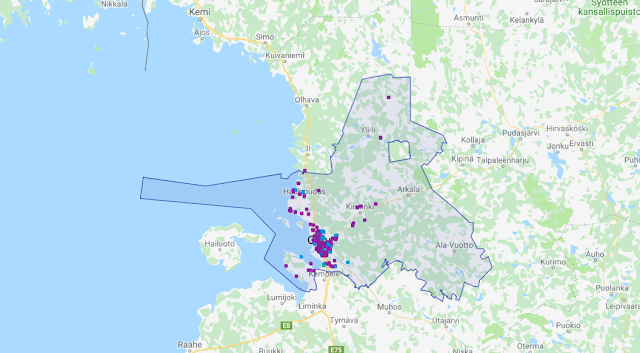Hello again!
This week our topics in class were tourism marketing trends in 2019 and sharing economy.
Based on sharing economy, we conducted an interesting case study on peer-to-peer (P2P) accommodation and ancillary services in Oulu.
Let's dive in to see what these are about.
Tourism Marketing Trends in 2019
Starting off with trends, we got introduced to some of them through a presentation by our teacher Petra Paloniemi. These trends were Authentic Local Experiences, Personalization, Travel for Good, Tech and Digital Detox.
As travellers nowadays want to experience authentic local lifestyles, these kinds of experiences are becoming ever more popular. The experiences are more immersive, introducing such elements as food, e.g. cooking classes in Lapland or making your own wine in France (Paloniemi 2019).
In 2019, travellers also want to feel less like unwanted outsiders and more like locals through interactions with residents in their everyday moments and also outside the tourist areas (Paloniemi 2019).
Personalization is created by collecting valuable data starting from the initial research and all the way to consuming (Paloniemi 2019).
And what is done with this data?
The data is then used to deliver spot-on messages and offers throughout the customer journey on, for example, booking engine-apps (Paloniemi 2019)!
Travel for greater good focuses on responsible tourism, with Millenials and Generation Z in the travel market. Sustainability and greenness are important to them and the desire to make a positive impact on communities has created the voluntourism industry (Paloniemi 2019).
Through the growing development of tech, tech-savvy solutions are being developed and becoming more advanced. Such advancements allow the instant booking of tours, restaurant reservations, attraction tickets and more, directly from smartphones. Augmented reality (AR) apps are also becoming more common - from language translators to city guides (Paloniemi 2019).
And last but not the least trend: Digital Detox.
Nowadays, with the excessive use of smartphones and other devices, it's no wonder that one might want a detox from their phone for a few days, right?
Some tourism companies have started to offer tours to off-beaten-tracks without wifi or even electricity, while some hotels and resorts encourage guests to use their devices less - or go as far as setting phone bans. Despite the peace of mind and relaxation these detoxes bring, there is a definite downside to marketers. That is, the loss of invaluable user-generated content. (Paloniemi 2019.)
Alright, onto the next topic ↓
Sharing Economy in Tourism and Marketing
Sharing economy is an economic model based on sharing
underutilized assets for monetary and non-monetary benefits, that is largely
focused on peer-to-peer (P2P) marketplaces (DeCrop 2016). Airbnb, HomeAway and Couchsurfing
are examples of P2P accommodation (DeCrop 2016), and ancillary services around
P2P accommodation can be related to food, transportation, activities, tours and
so on (Jutila 2019).
According to DeCrop, the fast development of sharing economy is due to tourists' increasing openness to self-guided holidays and desire to experience authentic experiences. The economic crisis and unemployment have also pushed many to pay more attention to prices and value for money. (DeCrop 2016.)
Case Study: P2P Accommodation and Ancillary Services in Oulu*
Looking at the P2P accommodation situation in
the Oulu Region, there are 262 active rentals. Of those rentals, 82% are on Airbnb,
15% on HomeAway and 3% on both, with sizes ranging from shared rooms
to entire homes.
 |
| Airbnb and HomeAway rentals on the map |
Other than rental accommodation services, searching with “Oulu” there are 2 783 Hosts on Couchsurfing as of 13 April 2019.
Then, searching for P2P ancillary
services, starting with Airbnb there is only 1 experience provider, 0 results with eatwith, and searching for “food
experience Oulu” or “Dining experience Oulu” both in Finnish and English only
leads to restaurant reviews.
For
transportation services, Bloxcar provides 6
search results for cars in Oulu. Other transportation services
when searching “carpooling Oulu” give results to sites such as kyydit.net –
which is mostly for city to city carpooling.
Other than the already existing accommodation and ancillary services, we thought of some smaller everyday services that guests might look for. When booking P2P accommodation, guests might want the option to use the kitchen or to do laundry. While for example Airbnbs are often well-equipped, we found out that if there's no option to do laundry at the accommodation, there also aren't laundromats - which are common in many countries. There is one laundromat company in Finland, but they do not operate in Oulu.
As for P2P accommodation hosts, usually their rentals are fully equipped with everyday commodities. But, in case they have a constant flow of guests, outsourcing cleaning or laundry services could be easier for them 😄
To wrap up this post, we think that P2P services are a great way to provide local authentic experiences! We could not really think of many downsides, other than the fact that the legality of the services and respecting the surroundings should be taken into account.
Here are some examples of what kind of disputes P2P services have caused:
We'd love to hear your thoughts and ideas regarding the marketing trends or sharing economy!
Stay tuned for our next post 😉
*case study originally conducted on 11 April, data numbers checked on 13 April 2019.
---
Bibliography
Paloniemi, P. 2019. Lapland UAS. Lecture. Some Trends Related to Tourism Marketing. 8 April 2019.
Jutila, S. 2019. Lapland UAS. Lecture. Possiblities and Challenges in Peer-to-Peer Accommodation. 8 April 2019.
No comments:
Post a Comment